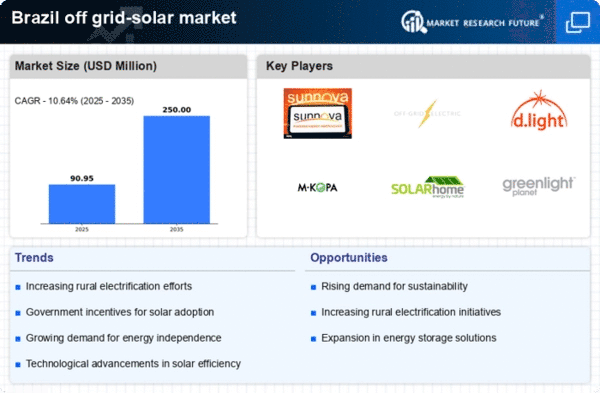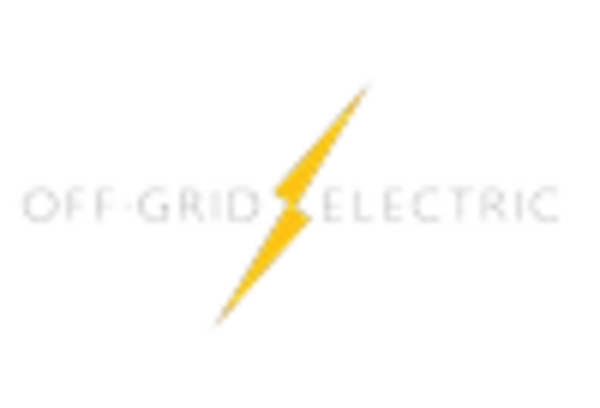Rising Energy Costs
Brazil has witnessed a steady increase in energy costs, which has prompted consumers and businesses to seek alternative energy solutions. The off grid-solar market offers a viable option for reducing reliance on expensive grid electricity. With energy prices rising by approximately 10% annually, many households and enterprises are turning to solar energy as a cost-effective solution. The initial investment in solar technology is often offset by long-term savings on energy bills. Furthermore, the decreasing costs of solar panels and batteries have made it more accessible for consumers to invest in off grid systems. This trend is likely to continue, as more individuals and businesses recognize the financial benefits of adopting solar energy, thereby propelling the off grid-solar market in Brazil.
Increasing Energy Access in Remote Areas
The off grid-solar market in Brazil is experiencing growth due to the increasing need for energy access in remote and rural areas. Approximately 15 million Brazilians lack reliable electricity, which creates a substantial demand for off grid solutions. The off grid-solar market provides an effective alternative to traditional grid connections, which can be costly and logistically challenging in these regions. By utilizing solar technology, communities can gain access to essential services such as lighting, refrigeration, and communication. This shift not only enhances the quality of life but also promotes economic development. The Brazilian government has recognized this need, leading to initiatives that support the deployment of solar systems in underserved areas, thereby driving the off grid-solar market forward.
Environmental Awareness and Sustainability
There is a growing awareness of environmental issues among the Brazilian population, which is influencing the off grid-solar market. As concerns about climate change and pollution rise, more consumers are seeking sustainable energy solutions. The off grid-solar market aligns with these values, providing clean energy that reduces carbon footprints. In Brazil, where deforestation and environmental degradation are pressing issues, the adoption of solar energy is seen as a way to mitigate these challenges. The government has also been promoting sustainability initiatives, encouraging the use of renewable energy sources. This cultural shift towards environmental responsibility is likely to drive demand for off grid solar solutions, as individuals and businesses aim to contribute positively to the planet while meeting their energy needs.
Technological Advancements in Solar Energy
The off grid-solar market in Brazil is benefiting from rapid technological advancements in solar energy systems. Innovations such as improved solar panel efficiency, energy storage solutions, and smart grid technologies are enhancing the viability of off grid systems. These advancements allow for more effective energy generation and storage, making solar solutions more appealing to consumers. The off grid-solar market is witnessing the introduction of integrated systems that combine solar panels with battery storage, enabling users to harness energy even during non-sunny periods. As technology continues to evolve, it is expected that the cost of solar installations will decrease further, making off grid solutions more accessible to a broader audience. This trend is likely to stimulate growth in the off grid-solar market as consumers seek reliable and efficient energy alternatives.
Government Policies and Regulatory Frameworks
The Brazilian government has implemented various policies and regulatory frameworks that support the growth of the off grid-solar market. Incentives such as tax breaks, subsidies, and simplified permitting processes are designed to encourage investment in solar energy. These measures aim to increase the adoption of renewable energy sources, particularly in areas where grid access is limited. The off grid-solar market is poised to benefit from these supportive policies, as they lower the barriers to entry for consumers and businesses. Additionally, the government has set ambitious renewable energy targets, which further drive the demand for off grid solutions. As these policies continue to evolve, they are likely to create a more favorable environment for the expansion of the off grid-solar market in Brazil.
















